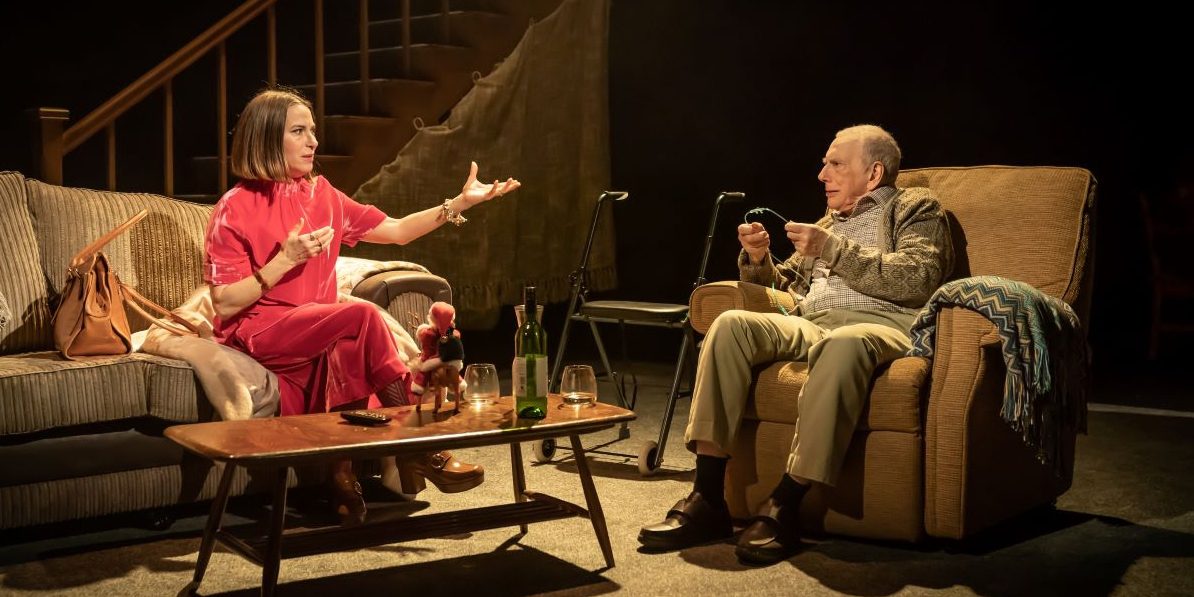Stephen Karam had real success a few years back with his play ‘The Humans’, which like this current offering, enjoyed success in New York before coming to Hampstead, and draws extensively on his family background. But there the similarities end. It is not always a good idea to go back beyond a breakthrough play to its predecessors: ‘Sons of the Prophet’, despite interesting themes and some fine performances, is a disappointingly undercooked and overlong production.
Karam situates the drama in the Maronite Christian community of Eastern Pennsylvania, his own father’s heritage. Two brothers, both gay, have recently lost their father to a car crash and heart attack caused by a prank involving a deer decoy. One brother, Joseph, is wrestling with undiagnosed pain which has lost him his sporting career. He tries to finance the horrendous costs of his medical tests by taking a job with a wealthy but exploitative and depressive widow. The other – and younger – brother, who was born with only one ear, is hoping to go to college, and the two of them are also trying to manage their elderly uncle, who is as frail as he is irascible and inconveniently opinionated. Into this elaborate mix you also need to place a gay but privileged journalist who is seeking to write up the story of the family’s loss, and the perpetrator of the decoy prank, who wishes to apologise for his actions while not taking any penalty ahead of pursuing a football career. And that is just the start….
As you can see, there is a lot – just too much in fact – going on in this play; and none of the many themes receive an adequate airing in the seven scenes that run straight through (all bearing pretentious titles from the writings of the Lebanese-American writer Gibran). Sexuality and religious identity, the perils of US health care, the authenticity of public reparations, rural versus urban values, liberal privilege up against real poverty, issues of race…. Just one or two of these would have been more than enough. But here there is little time to do more than box-check each item; and as a result most of the characters involved remain two-dimensional mouthpieces for viewpoints despite the best efforts of a talented cast to fill out their roles.
The one exception is the character of the elder brother, and Irfan Shamji does a wonderful job in taking this opportunity to develop moments of genuine pathos and dark comedy in the life of this much-put-upon and endearing man. We do genuinely feel for him as he struggles to hold his health, his family and his job together in face of the crazily selfish behaviour around him. He has the makings of a modern version of the kind of Everyman victim-figures Arthur Miller made famous.
Alongside him Eric Sirakian is charmingly quirky as the younger brother, and Raad Rawi makes the most of the uncle’s politically incorrect outbursts. Jane Cowan does her best with the caricature role of the depressive, intrusive widow, Gloria, and Jack Holden make the journalist more human and empathetic than the text suggests. Raphael Akuwudike is plausible as the partially remorseful footballer, and Holly Atkins and Sue Wallace produce a lively and contrasted set of cameos. Sets are flexible in suggesting locations, rather than going for detailed naturalism; but even though scene changes are slick, the pace is slow and many people around me were sneaking a view of their watches after the first hour had passed. The play could really be shorter to advantage.
The best scenes are the public ones where there is more drama and fewer issues. The bus-stop encounter between Joseph and Timothy (the journalist) works well, not least for the sarcastic interventions of the ticket clerk; the public meeting to showcase the footballer’s apology is a neat study in the levels of hypocrisy and role-play involved in such exercises, and includes a very funny hot mic episode.
That said, it is difficult to see a strong case for this play on its own merits, and it is the hard work and skill of the cast that narrowly lift it to a three-star rating overall.

